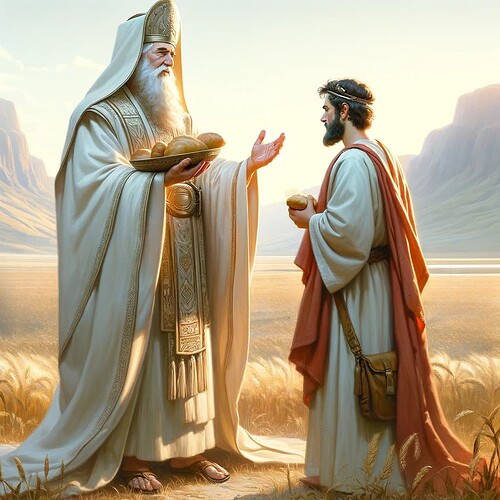![]() January 07: Genesis 13-14 - Choices and Conflicts in Abram’s Journey
January 07: Genesis 13-14 - Choices and Conflicts in Abram’s Journey
 Introduction
Introduction
Today, we explore Genesis 13 and 14, pivotal chapters in the story of Abram. These passages narrate the separation of Abram and Lot, and the subsequent conflicts, showcasing themes of choice, family dynamics, and trust in God’s promises.
To follow along with our reading plan, view the schedule here: AIgniteScripture Reading Plan.
 Genesis 13: Abram and Lot Separate
Genesis 13: Abram and Lot Separate
In Genesis 13, we witness the amicable separation of Abram and Lot due to their growing wealth and need for more land. This event highlights the importance of peace and wisdom in resolving family disputes.
Key Verse: “So Lot chose for himself all the Jordan Valley, and Lot journeyed east. Thus they separated from each other.” — Genesis 13:11
 Genesis 14: The Battle of the Kings
Genesis 14: The Battle of the Kings
Genesis 14 details a conflict involving several kings, including the capture of Lot. Abram’s response demonstrates his courage and commitment to family, as well as God’s protective hand over his chosen.
Key Verse: “Then Abram heard that his kinsman had been taken captive. He led forth his trained men, born in his house, 318 of them, and went in pursuit as far as Dan.” — Genesis 14:14
 Key Themes and Reflections:
Key Themes and Reflections:
Decision-Making and Relationships: The story of Abram and Lot teaches us about making wise choices while maintaining relationships. Conflict and Resolution: Abram’s involvement in the battle shows his courage and resourcefulness, as well as his reliance on God. God’s Faithfulness: Despite challenges, God’s promise to Abram remains steadfast, a reminder of His unwavering faithfulness.
 Today’s Application:
Today’s Application:
Reflect on how you handle conflicts and make decisions, especially in the context of family and relationships. Consider Abram’s example of wisdom, courage, and reliance on God’s promises.
 Hidden Gem:
Hidden Gem:
Did you know? The number 318, mentioned in Genesis 14, is often interpreted symbolically in Jewish tradition, reflecting the idea of effective leadership and divine protection.
 Reflective Q&A:
Reflective Q&A:
![]() Genesis 13-14: Family and Faith
Genesis 13-14: Family and Faith
![]() Navigating Family Dynamics: How does the story of Abram and Lot’s separation provide insight into handling family relationships?
Navigating Family Dynamics: How does the story of Abram and Lot’s separation provide insight into handling family relationships?
A: This narrative shows the importance of peace, mutual respect, and wisdom in dealing with family conflicts, prioritizing harmony over material possessions.
![]() Leadership in Times of Conflict: What can we learn from Abram’s response to the kidnapping of Lot?
Leadership in Times of Conflict: What can we learn from Abram’s response to the kidnapping of Lot?
A: Abram’s actions demonstrate strong leadership, courage, and a sense of responsibility, while also showing trust in God during crises.
 Join the Discussion:
Join the Discussion:
How do these chapters from Genesis shape your understanding of conflict resolution, family dynamics, and faith in God’s promises? Share your thoughts and experiences in the comments below!
#Genesis13 #Genesis14 #AbramAndLot #FamilyDynamics #Faith #BibleStudy #SpiritualJourney #AIgniteScripture
![]() See You Tomorrow in Genesis: Continue your journey through Genesis. Dive deeper into the life of Abram and uncover more lessons about faith and God’s plans.
See You Tomorrow in Genesis: Continue your journey through Genesis. Dive deeper into the life of Abram and uncover more lessons about faith and God’s plans.
 Join the AIgniteScripture Community!
Join the AIgniteScripture Community!
Deepen your biblical understanding and connect with a supportive community. Whether you’re starting your spiritual journey or seeking deeper insights:
- Free Members: Engage in discussions and access a wide range of biblical resources. Join here.
- Supporters Membership: Explore in-depth with personalized content and exclusive community interactions. Become a Supporter.
![]() Stay Connected: Subscribe to our AIgniteScripture Newsletter for daily insights and readings. Subscribe here.
Stay Connected: Subscribe to our AIgniteScripture Newsletter for daily insights and readings. Subscribe here.
